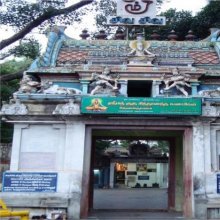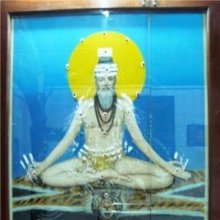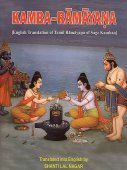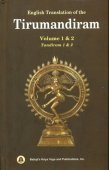Poem: 2 definitions
Introduction:
Poem means something in the history of ancient India, biology. If you want to know the exact meaning, history, etymology or English translation of this term then check out the descriptions on this page. Add your comment or reference to a book if you want to contribute to this summary article.
Images (photo gallery)
India history and geography
Source: Singhi Jain Series: Ratnaprabha-suri’s Kuvalayamala-katha (history)Poems or Stotras were composed by those pursuing the spiritual life in the Hermitages (or Ashrams) of ancient India, as vividly depicted in the Kathās (narrative poems) such as Uddyotanasūri in his 8th-century Kuvalayamālā (a Prakrit Campū, similar to Kāvya poetry).—Page 87.20-28: Here is a vivid description of the intellectual and spiritual life in the Aśrama of a Jaina Muni. Uddyotanasūri gives a list of twenty-one methods of study and discussions and approaches to the tenets of religion and philosophy, [e.g., composing new poems or Stotras] [...]. Also see the description of the hermitage of Divākara Mitra described by Bāṇa in the Harṣacarita.

The history of India traces the identification of countries, villages, towns and other regions of India, as well as mythology, zoology, royal dynasties, rulers, tribes, local festivities and traditions and regional languages. Ancient India enjoyed religious freedom and encourages the path of Dharma, a concept common to Buddhism, Hinduism, and Jainism.
Biology (plants and animals)
Source: Wisdom Library: Local Names of Plants and DrugsPoem [पोएं] in the Konkani language is the name of a plant identified with Breynia retusa (Dennst.) Alston from the Phyllanthaceae (Amla) family having the following synonyms: Phyllanthus retusus, Breynia patens. For the possible medicinal usage of poem, you can check this page for potential sources and references, although be aware that any some or none of the side-effects may not be mentioned here, wether they be harmful or beneficial to health.

This sections includes definitions from the five kingdoms of living things: Animals, Plants, Fungi, Protists and Monera. It will include both the official binomial nomenclature (scientific names usually in Latin) as well as regional spellings and variants.
See also (Relevant definitions)
Full-text (+7088): Mahakavya, Ramayana, Kavita, Gita, Kavya, Kumarasambhava, Ghatakarpara, Samhita, Kavite, Ainkurunuru, Khandakavya, Sandamitaka, Meghaduta, Kavyabandha, Gangamahatmya, Adikavya, Sargabandha, Shishupalavadha, Halayudha, Kabba.
Relevant text
Search found 190 books and stories containing Poem; (plurals include: Poems). You can also click to the full overview containing English textual excerpts. Below are direct links for the most relevant articles:
Paradoxism - The Last Literary Vanguard of the < [April – June, 2001]
Book Reviews < [October – December, 1994]
The Poetry of Bhatnagar < [January – March, 1983]
Parama Samhita (English translation) (by Krishnaswami Aiyangar)
Poems included the collection Paripāḍal expound the Pāñcarātra < [Introduction]
The Sātvata movement and Bhāgavata worship < [Introduction]
The Pāñcarātra and the Tamil Ālvārs < [Introduction]
Satirical works of Kshemendra (study) (by Arpana Devi)
9.10. Summary of the Ranjan (1927) < [Chapter 1 - Introduction]
9.9. Summary of the Bahurupī (1926) < [Chapter 1 - Introduction]
9.7. Summary of the Rahgharā (1916) < [Chapter 1 - Introduction]
Sanskrit sources of Kerala history (by Suma Parappattoli)
15. Short Poems describing Kerala history < [Chapter 4 - Traces of Historical Facts from Sandesha Kavyas and Short poems]
6. The Bhrngasandesa by Vasudeva < [Chapter 4 - Traces of Historical Facts from Sandesha Kavyas and Short poems]
16. Yamaka poems of Vasudeva < [Chapter 6 - Miscellaneous Sanskrit works bearing on Kerala history]
Vasudevavijaya of Vasudeva (Study) (by Sajitha. A)
Date and Authorship of the Vāsudevavijaya < [Chapter 2 - Vāsudevavijaya—Authorship and Content Analysis]
Is Vāsudevavijaya a Mahākāvya? < [Chapter 4 - Vāsudevavijaya—A Literary Appreciation]
Dvyāśrayakāvya / Kumārapālacarita of Hemacandra < [Chapter 1 - Śāstrakāvyas—A Brief Survey]
Chaitanya Bhagavata (by Bhumipati Dāsa)
Verse 2.3.156 < [Chapter 3 - The Lord Manifests His Varāha Form in the House of Murāri and Meets with Nityānanda]
Verse 1.7.18 < [Chapter 7 - Śrī Viśvarūpa Takes Sannyāsa]
Verse 2.26.72 < [Chapter 26 - Descriptions of the Mercy Bestowed on Śuklāmbara and Vijay and the Lord’s Desire to Accept Sannyāsa]
Related products





